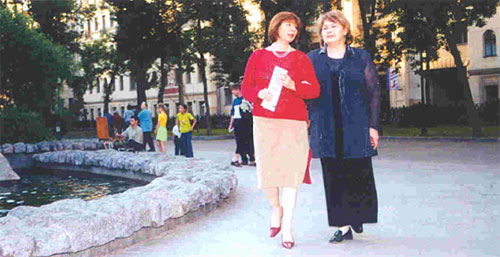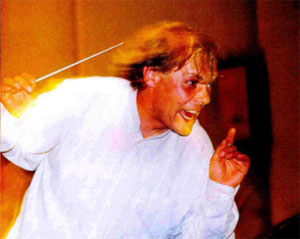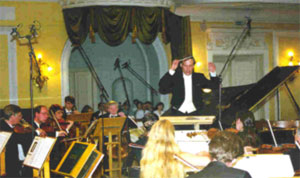- Русский
- English
The Moscow Symphony Orchestra
"We're on a constant voyage of creative discovery," says conductor Vladimir Ziva of himself and the eighty members of the Moscow Symphony Orchestra, the ensemble he has led on a regular basis for the past five seasons and whose music director he became just over a year ago.
That voyage oа discovery includes not only Ziva and the Moscow Symphony, but also the audiences that hear its frequent concerts at the Moscow Conservatory and Tchaikovsky Concert Hall. For the orchestra programs almost always include something unknown or unfamiliar to Moscow conceit-goers: a seldom-played work, by a famous composer, or music by someone whose name is rarely, if ever, seen here on concert posters.
As a rule, the responses to these musical rerities - in recent seasons such works as Polish composer Karol Szymonowski’s Symphony No. 2, the Violin Concerto of Nikolai Myaskovsky, and the nearly forgotten cantatas of Mr. Myaskovski's famed mentor, Nikolai Rimsky-Korsakov - are enthusiastically positive, giving strong evidence that Moscow listeners are more than willing to break away form the staple diet of well-known classics which most local orchestras seem content to dish out.
Founded in 1989. the Moscow Symphony has the special distinction of being the first privately funded orchestra established on Russian soil in Communist limes. Its rival, the Russian National Orchestra, makes a similar claim, but the truth - a matter of a few months - is on the Moscow Symphony's side.
Founding the orchestra and tirelessly guiding it through a dozen often financially and artistically trying years has been a pair of sisters. Ellen and Marina Levine. Soviet-born and once emigres to the United States, they returned to their native shores in 1988 to produce a pop concert at Luzhniki Stadium. Soon afterward, they took on the task of engaging a Russian orchestra for a world concert tour. In the face of bureaucratic obstacles, the sisters eventually abandoned the idea of signing Up one of the existing state ensembles and. Instead, put together an orchestra from scratch.

The world tour never materialized, but the orchestra survived. Direction during its early years fell to a series of guest conductors. Among them, in the spring of 1993, was the distinguished French-born maestro, Antonio de Almeida, contracted by a Hong Kong-based recording firm to make a series of CDs with the orchestra.
Almeida and the orchestra took to each other immediately and a few months later, the conductor accepted a five-year appointment as the Moscow Symphony's first music director. Rehearsals for their initial concert together took place over the tumultuous first weekend of October 1993, as President Yeltsin's government lay siege to the Parliament, holed up in its then-home, the Russian While House. "When we began," the conductor remarked a short time later, "we had no idea whether the concert would ever take place."
Hut it did, in fact, take place, on schedule, the following Wednesday, and for the next three-and-a-half seasons, until his sudden death in February 1997, Mr. Almeida went on to bring memorable music both to Moscow audiences and, through a highly acclaimed series of recordings, to listeners throughout the world.
Almeida, according to Ellen Levine, "fell in love with Russia, and Russian people, and with musical life in Moscow. Over the last three years of his life, he put all of his energies and all of his emotions into his work here."
Picking up the baton from Mr. Almedia was forty-year-old Vladimir Ziva, who had made his principal musical home in Nizhny Novgorod as music director of that city's Philharmonic.
Ziva first came to public attention two decades ago under the aegis of the great Soviet pianist Sviatoslav Richter, who encountered the young conductor one evening playing piano accompaniment at a Moscow experimental opera theater. "If I had known Richter was in the audience," Ziva says. "I would never have dared to come out and play." Richter promptly recruited Ziva for his December Nights festival at the Pushkin Museum. For two seasons, Ziva stayed at the museum, leading operas by the English composer Benjamin Britten, while Richter played the unaccustomed role of stage director.
 Ziva’s appointment as music director of the Nizliny Novgorod Philharmonic came in 1988, following an apprenticeship as assistant conductor of the Moscow Philharmonic. For a few seasons in the early 1990s, he simultaneously held the principal conductor's post at St. Petersburg's Mussorgsky Theater of Opera and Ballet.
Ziva’s appointment as music director of the Nizliny Novgorod Philharmonic came in 1988, following an apprenticeship as assistant conductor of the Moscow Philharmonic. For a few seasons in the early 1990s, he simultaneously held the principal conductor's post at St. Petersburg's Mussorgsky Theater of Opera and Ballet.
A product of the conservatories in both Moscow and St. Petersburg, Ziva has come to rank among the top handful of Russian conductors of his generation and, indeed, of currently active Russian conductors in general. Though his style on the podium often seems overly energetic, it obviously produces results. Under his leadership, the Moscow Symphony has gained increased coherence and clarity and has risen to lake a leading place among the dozen or so full-sized orchestras that populate - even over-populate, in the opinion of some observes -the Moscow concert stages. Ziva has also won a large and devoted audience, which usually fills both the Conservatory and Tchaikovsky Concert Hall to capacity.
Though the costs of running an orchestra in Russia remain low by international standards, ticket prices remain lower still. For the Levine sisters, maintaining the Moscow Symphony without government support of any kind has been a constant struggle. Coming to their aid five years ago was the Swiss food giant Nestle, underwriting the orchestra's principal series of concerts at the Conservatory, called "Musical Anniversaries," which honors composers on the major anniversaries of their birth and death. While the "anniversaries" concept sometimes leads to odd programming, it has nevertheless proved itself enormously popular and has continued to draw support from Nestle.
Another major source of income is recordings. The Moscow Symphony now has more than one hundred CDs to its credit, many of them with Almeida and Ziva at the helm, but a very large portion directed by guest conductors from both Russia and abroad.
Among the orchestras most notable recordings are the prize-winning, complete sets of symphonies, all of them under the baton of Almeida, by three little-known, but nevertheless significant composers of the twentieth century: Italian Gian Francesco Malipiero, Frenchmen Charles Tournemire and Henri Sauguet. The orchestra has also received acclaim for its lengthy series of recordings of scores from classic American films, led by a noted specialist, American conductor William Stromberg.
The Moscow Symphony makes it's working home at the Mosfilm cinema studios on Sparrow Hills, close to the landmark skyscraper of the Moscow Slate University. There, its staff occupies a crowded and bustling office in the newer of Mosfilm's two sound studios, while the orchestra itself rehearses and records in the adjacent older studio. The orchestra's choice of the biter for its work is a deliberate one: for, though, dingy and run-down in appearance, the older studio boasts better acoustics than its more recent counterpart.
 Regarding himself as one of the orchestral team as well as its leader. Ziva has fostered an unusually congenial atmosphere within the Moscow Symphony. “I'm your friend,” he tells his players, "so long as you're willing to work”. Many of the orchestra’s players have come to it voluntarily from Other major Moscow ensembles, though not for economic reasons - the orchestra pays no more than the normal scale - but because it has the rare distinction among local orchestras of being known as a pleasant group in which to work.
Regarding himself as one of the orchestral team as well as its leader. Ziva has fostered an unusually congenial atmosphere within the Moscow Symphony. “I'm your friend,” he tells his players, "so long as you're willing to work”. Many of the orchestra’s players have come to it voluntarily from Other major Moscow ensembles, though not for economic reasons - the orchestra pays no more than the normal scale - but because it has the rare distinction among local orchestras of being known as a pleasant group in which to work.
Each year, the orchestra tries to fill some of its vacant chairs through an open competition. Two seasons ago, none of the contestants made the grade. Last year, three out of twenty were chosen.
The Moscow Symphony first went abroad in 1991, playing concerts at Wembley Stadium in London and for audiences in Finland. Since then, it has traveled widely in Western Europe and gone twice to Japan, as well as once to the United States, Hong Kong and South Korea. Since 1997, it has played each year in Germany as pan of the Riedenburg Summer Festival. Last August, it took a principal part in a celebration of Russian culture, called "An Without Frontiers," in Cannes, France, playing not only concerts, but also accompanying the dancers of the Kremlin Ballet troupe with the music of Sergei Prokofiev's Romeo and Juliet.
Ziva regards his orchestra as "a living organism." constantly seeking to reach out and expand into new areas of its art. Playing for ballet last August was a step in that direction. This summer for the first time, it turns to opera in a concert performance in Amsterdam of Rimsky-Korsakov's "Mozart and Salieri." In the future, Ziva and the Levine sisters would like to try more ballet and opera, and perhaps organize a series of "pop" concerts, with light classical favorites played in a relaxed atmosphere. "We're open to all proposals," Marina Levine says.
Currently on the agenda for this coming season are concerts in the auditorium of Moscow Stale University, carrying on a tradition established there by the Slate Orchestra of die USSR and its long-time musical director, the legendary Yevgeny Svetlanov.
Also ahead is a continuation of the orchestra's internship program. Last autumn, under die auspices of the American-Russian Young Artist Orchestra, a cellist from the United Slates, Scott Brady, was offered an internship with the orchestra. It proved to be such a success that the Moscow Symphony now plans to offer the same opportunity on a regular basis to other young musicians from the United States, and perhaps to those from other countries as well.
Following recording sessions and tours in Germany and the Netherlands this summer, the orchestra returns in the autumn to the Moscow concert stage. The focal point will be its "Musical Anniversaries" subscription series at the Conservatory, featuring, as usual, music outside the mainstream repertoire. Novelties this coming season include a group of works from the first half of the twentieth century: violin concertos by three outstanding composer proteges of Rimsky - Korsakov (Anion Arensky, Alexander Glazunov, and Igor Stravinsky); a piano concerto by Arensky's pupil Nikolai Medtner; and the Lyric Symphony of Austrian composer Alexander von Zemlinsky. The First Symphony of Vastly Kalinikov, composed in 1895, is also scheduled; it is a lovely and unjustly neglected work that bears the unmistakable stamp of the composer's idol, Peter Ilich Tchaikovsky.
Jay Coote, Capital Perspective, July-August 2001


